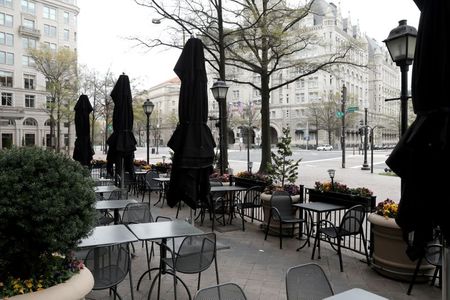(Reuters) – Here’s what you need to know about the coronavirus right now:
Twitter storm as Trump thinks aloud on cures
Donald Trump’s suggestion that injections of disinfectant could be used to combat the coronavirus have caused an overnight Twitter storm.
Reacting to new U.S. research on the virus’ interactions with sunlight, heat and various chemicals, Trump said medics should try to apply the findings to coronavirus patients by applying light or disinfectant directly.
“Is there a way we can do something like that by injection, inside, or almost a cleaning?” he said. “It would be interesting to check that.”
Medical experts rushed to warn against such interventions, saying they were more likely to kill than cure.
Kicking the can down the road
Leaders of EU countries agreed rough outlines of a joint recovery fund overnight but also kicked down the road the big contention about whether such funds would be available as outright gifts or merely loans. Put simply, the frugal and rich north remains wary of bailing out its poorer (and in its view, more profligate) southern neighbours. Emmanuel Macron of France made it clear where he stood:
“I’m saying this sincerely,” he told reporters. “If Europe raises debt to loan to others, that won’t live up to the response we need.”
Fair access: WHO readies Friday announcement
The World Health Organization (WHO) said it would announce a “landmark collaboration” on Friday to accelerate the research, development and production of safe, effective drugs, tests and vaccines for the coronavirus.
The emphasis would also be on making them “accessible to everyone who needs them, worldwide”.
“There should not be a divide between the haves and the have-nots,” WHO Director-General Tedros Adhanom Ghebreyesus said on April 6 when he discussed his plans to announce the initiative.
Coronavirus antibodies: more around than you think?
A preliminary survey of 3,000 New York state residents found that nearly 14% of those tested had antibodies against the coronavirus, suggesting that some 2.7 million may already have been infected, Governor Andrew Cuomo said on Thursday.
The survey targeted people who were out shopping, but not working, meaning they were probably not essential workers like grocery clerks or bus drivers. Those surveyed were more likely to test positive for antibodies than someone isolated at home, Cuomo said.
Cuomo said the preliminary data added to his understanding of the virus and would inform his plans to reopen the state, with social distancing measures possibly relaxed more quickly in less infected regions.
(Compiled by Mark John and Karishma Singh)


